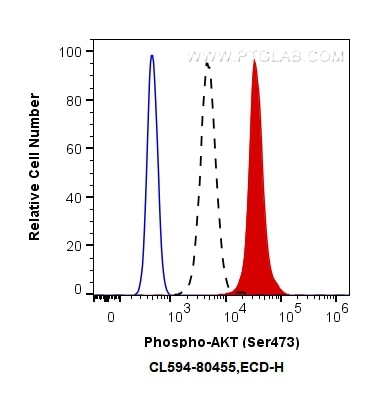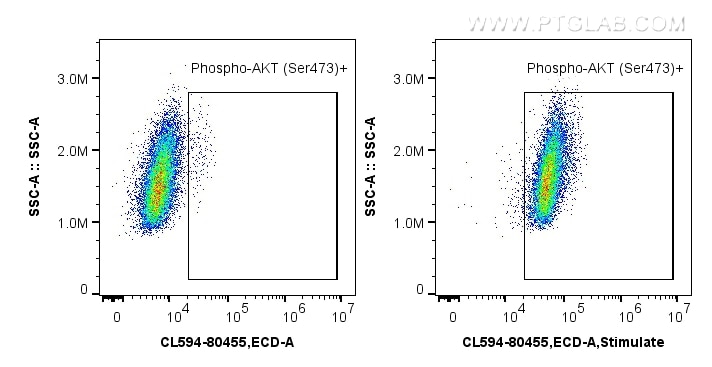Phospho-AKT (Ser473) Rekombinanter Antikörper
Phospho-AKT (Ser473) Rekombinant Antikörper für FC (Intra)
Wirt / Isotyp
Kaninchen / IgG
Getestete Reaktivität
human
Anwendung
FC (Intra)
Konjugation
CoraLite®594 Fluorescent Dye
CloneNo.
2E17
Kat-Nr. : CL594-80455
Synonyme
Galerie der Validierungsdaten
Geprüfte Anwendungen
| Erfolgreiche Detektion in FC | Mit Calyculin A behandelte HEK-293-Zellen |
Empfohlene Verdünnung
| Anwendung | Verdünnung |
|---|---|
| Sample-dependent, check data in validation data gallery | |
Produktinformation
CL594-80455 bindet in FC (Intra) Phospho-AKT (Ser473) und zeigt Reaktivität mit human
| Getestete Reaktivität | human |
| Wirt / Isotyp | Kaninchen / IgG |
| Klonalität | Rekombinant |
| Typ | Antikörper |
| Immunogen | Peptid |
| Vollständiger Name | v-akt murine thymoma viral oncogene homolog 1 |
| Beobachtetes Molekulargewicht | 58 kDa |
| GenBank-Zugangsnummer | NM_005163 |
| Gene symbol | AKT1 |
| Gene ID (NCBI) | 207 |
| Konjugation | CoraLite®594 Fluorescent Dye |
| Excitation/Emission maxima wavelengths | 588 nm / 604 nm |
| Form | Liquid |
| Reinigungsmethode | Protein-A-Reinigung |
| Lagerungspuffer | BS mit 50% Glyzerin, 0,05% Proclin300, 0,5% BSA, pH 7,3. |
| Lagerungsbedingungen | Bei -20°C lagern. Vor Licht schützen. Nach dem Versand ein Jahr stabil. Aliquotieren ist bei -20oC Lagerung nicht notwendig. 20ul Größen enthalten 0,1% BSA. |
Hintergrundinformationen
AKT is a serine/threonine kinase and it participates in the key role of the PI3K signaling pathway. Phosphatidylinositol-3 kinase (PI3K) is the key regulator of AKT activation. The recruitment of inactive AKT protein to PIP3-rich areas of the plasma membrane results in a conformational change that exposes the activation loop of AKT. AKT's activating kinase, phosphoinositide-dependent protein kinase (PDK1) , is also recruited to PIP3 microdomains. PDK1 phosphorylates AKT on threonine 308 (Thr308) of the exposed activation loop, activating AKT and leading to a second phosphorylation of AKT at serine 473 (Ser473) by a kinase presumed to be mTORC2 that further potentiates kinase activity. Active AKT will phosphorylate various downstream protein targets that control cell growth and translational control and act to suppress apoptosis. (PMID: 31594388, PMID: 30808672)



